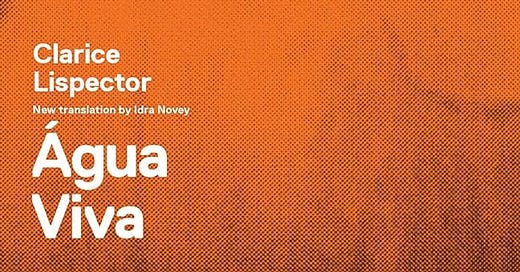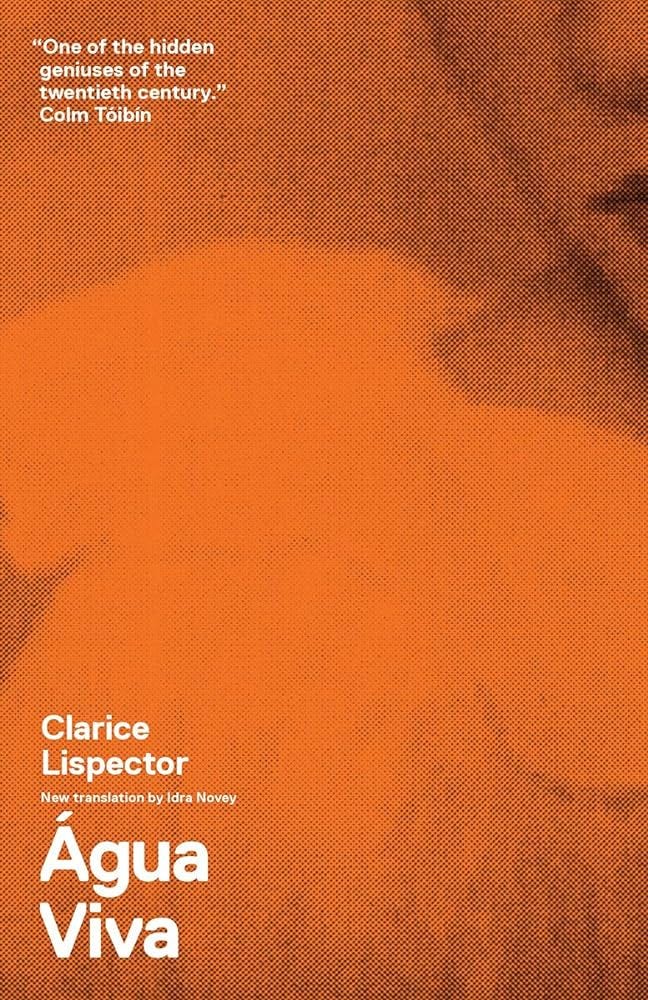Clarice Lispector’s 1973 Água Viva is a famously fragmented text that reveals itself with no narrative order. Yet, it’s not in disorder. Its cadence reflects life and, increasingly, its interruptions. Lispector’s book is almost prophetic in its syncopated unfolding, engaging with experience in a way that presents current-day readers with a mirror of our disjointed and disrupted modern life. To read Água Viva is to feel convulsed and disoriented, and to embrace—indeed, even celebrate—these emotions as an inevitable part of navigating existence. This visionary text deserves a rereading and resituating with the canon of contemporary literature, especially in the wake of groundbreaking fragmented texts, such as Anne Carson’s Float, Elena Ferrante’s Fratumaglia, Maggie Nelson’s Bluets, and Jenny Offill’s Dept. of Speculation.
The way in which the text attempts to approach an “I” while avowing the impossibility of this act is a literal manifestation of the intervallic, self-conscious lives we’ve led since the advent of the Internet and its irruption into the fabric of our everyday actions. It is nearly impossible to participate in the modern world without the use of electronic devices, foreign to our bodies, which attach to our physical selves to provide basic information without which it now seems impossible to live. Whether or not this difficulty arises out of dependency rather than actual need is irrelevant. What matters is that this dependence is real and that the reliance exists, such as our reliance on electricity and running water—services now regarded almost as essential human rights.
Água Viva reflects our actuality in a precocious way. Like the haiku, its compact portions of text provide uninterruptible moments of deep connection and presence, allowing readers to engage with art in a way that acknowledges—however problematic this may be—the constant onslaught of messages and information that accompany contemporary living. To read and reread this text is to marvel at Lispector’s understanding of what it feels like to absorb the world while being separate from it.
Her (mis)usage of grammar, too, uncannily represents our attempts to communicate with each other. She presents language as a malleable tool that is nevertheless able to chisel into existence, carving out instants of rugged, imperfect connection for others to observe, touch, and read. Her words are loaded both with the possibility of true communication and with the nuanced implication that it is inherently impossible. We often don’t know what we mean by what we say, think, or write, so how can we expect others to comprehend? Lispector avows: “I don’t know what I’m writing about: I am obscure to myself.”
Lispector gives voice to the ineffable both in form and format by presenting a hauntingly beautiful yet corrupted voice, one that is connected to the casual, broken shorthand that has emerged in our digitized lives, where expediency takes precedence over depth and exactness. In this manner, her diction becomes a living, breathing breathless metaphor for beingness—disjointed and lucid at best, richly murky and nearly illegible at most. In Lispector’s hands, fragmentation is not an attempt to reduce existence or to confound the reader but a truthful casting of how our minds work, and, on the fiftieth anniversary of its publication, her work deserves a newfangled standing amongst the prophetic works of modern literature.
Água Viva
By Clarice Lispector
Published by New Directions
88pgs, 5.1 x 7.9
Paperback: 978-0811219907 | June 2012 | $13.90
Ana María Caballero's work explores how biology delimits societal and cultural rites, ripping the veil off romanticized motherhood and questioning notions that package sacrifice as a virtue. She's the recipient of the Beverly International Prize, Colombia’s José Manuel Arango National Poetry Prize, the Steel Toe Books Poetry Prize, and a Sevens Foundation Grant. Her Pushcart Prize and Best of the Net-nominated work has been widely published and exhibited internationally, recently at bitforms, Gazelli Art House, UNIT, and L’Avant Galerie Vossen. She became the first artist to sell a poem at live auction in Spain, and her digital poems have been released by Diario ABC, TimePieces and Playboy. Recognized as a digital poetry pioneer, her work has been covered by major media outlets, and she regularly speaks at leading global events. The author of five books, with a sixth forthcoming in 2024, she's also the co-founder of digital poetry gallery theVERSEverse.





